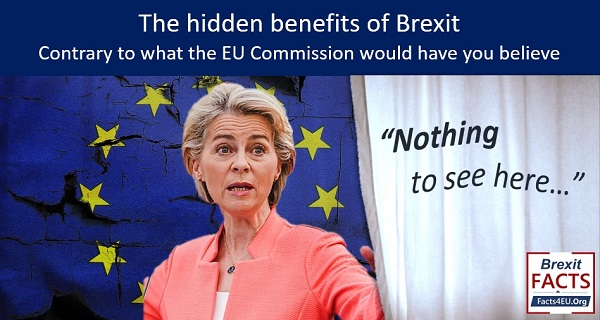Some forgotten Benefits of Brexit that need to be known
There’s more to Brexit than the Government’s Brexit-Lite list – here’s our first XI

Montage © Facts4EU.Org 2022
It was refreshing on the second anniversary of our official departure from the EU to see the UK Government finally getting round to putting out some communications material going beyond the glib statements we are all used to hearing. We should not have had to wait so long and it could have been more comprehensive. The Government could be mistaken for now being more interested in other issues, such as Net Zero. Well, we’re not.
To help readers see what more there is we thought today we would field our first eleven of additional entries to the list of Brexit benefits – and we’ll keep publishing more when we feel the achievements are in danger of being forgotten.
Brexit Facts4EU.Org Summary
Facts4EU’s 'First 11' extra Brexit benefits
1. Had we ‘remained’ we would have had to raise more in taxes
Thankfully, we have no need to consider how to impose €10 billion per annum of new taxes between 2026 and 2030, to help the EU pay back the bonds it is issuing to enable grants of €390 billion out of its Coronavirus Recovery Fund, the grants being non-refundable.
2. Had we ‘remained’ we would have faced a huge contingent liability on the EU Covid Fund
We have no need to factor into our own national accounts a contingent liability as guarantor for the balance of €360 billion of the Coronavirus Recovery Fund, where the money raised by the EU through bonds is on-lent to a member state but where all member states are liable for the bond repayments of those who fail to meet their obligations.
3. Had we ‘remained’ we would have been paying even more to the EU
Thankfully, we have no need to consider the high risk of escalation of the UK cash contribution to the EU Budget as the UK's GDP rises more quickly than the EU average and the UK's historical share of the EU Budget of 12% therefore rises – at the same time as the EU's money demands would be increasing.
4. Had we ‘remained’ we would be faced with increased costs of new members
We have no need to consider the costs and other implications for the UK of EU enlargement by the addition of at least the current three candidate countries – Serbia, Albania and Montenegro - and possibly more in future. That will never be our problem.
5. Had we ‘remained’ we would have faced more liabilities for the EIB
We also have no need to consider the new risks being taken on by the European Investment Bank that might compel the UK to pay in more capital, for example the highly-leveraged European Guarantee Fund under which the EIB takes a first-loss position of €25 billion to enable other creditors to commit €174 billion, a ratio of 7-to-1 with, in consequence, a much higher risk of loss.
6. Had we ‘remained’ we would still be on the hook for Eurozone insolvencies
We have no need to be concerned about a direct cost to the UK, levied through the EU Budget, of the over-indebtedness of the Eurozone, in case one or more of the EU's financial mechanisms became insolvent: the EU itself, the European Central Bank, the European Investment Bank, the European Investment Fund or the European Stability Mechanism Being in the EU is not risk free and in the past (eg Greece, Ireland) funding has been called up.
7. Had we ‘remained’ we could still be liable for EU public sector insolvencies
There is now no chance of the UK being made to bail out one of the many shadow domains of EU public sector indebtedness, which are not captured by the statistics of Eurostat, such as securitisations of banks' Non-Performing Loans, bank capital deficits, publicly-owned private companies, companies owned by multiple public entities but each with a minority share, and schemes where debt service depends on a public sector entity but under a commercial contract rather than a loan agreement. You never hear rejoiniacs talk about these financial liabilities.
8. By choosing to ‘leave’ we have completely closed the door on ever joining the Euro
The risk of joining the Euro remains in the background (with people like Lord Adonis still campaigning for us to join). In a few years’ time the number of EU members outside the Euro will have reduced to 4 – and were the UK to seek to rejoin the EU, membership of the Euro would be a key demand of the Commission. Being outside we continue to benefit from having our own sovereign currency – which ensures we have autonomy over interest rate policy, debt policy, and money supply.
9. Had we ‘remained’ we would still be funding the EU AID budget
It is little known outside the development aid world but the UK spent an additional £3.5bn on supporting the EU’s separate Foreign Aid programme between 2014-2020. This amount was on top of the annual membership fee and accounted for 12% of the UK’s development aid spending. This commitment ended when we left the EU but would be an even larger annual liability were, somehow, the UK to seek to rejoin.
An MP commented:
"One of the unalloyed benefits of leaving the EU is that we no longer need to finance its development aid programmes. These are generally of poor quality and characterised by waste and incompetence. As a DFID Minister it was always depressing to see so much of our aid budget transferred to unaccountable EU institutions to run programmes over which we had no control and whose results were rarely observable and more rarely audited."
The Rt Hon Sir Desmond Swayne TD VR MP

10. By choosing to ‘leave’ we have avoided the EU’s legal activism used to keep member states in check
We have distanced ourselves from an entity that seizes on obscure Treaty clauses as the need arises and has them interpreted by the EU Legal Service as enabling actions of the EU in new areas, where powers have not been specifically granted to the EU by member states for the eventuality in question, such as EU's attempts to find legal justification for blocking vaccine movements to the UK and for establishing the Coronavirus Recovery Fund. What you see is not what you get from the EU, there is always another risk, commitment or bill around the corner.
11. By choosing to ‘leave’ we are now able to change our procurement rules for naval shipbuilding
The UK government now has the ability to use the World Trade Organisation rules for naval procurement by dispensing with all the rules and case law of the EU which makes it harder for the UK to designate contracts as UK-only. This would give the government the choice to build all the RN fleet in the UK if it wished, including large support ships of Royal Fleet Auxiliary, the Coastguard fleet and the proposed UK national flagship. This freedom would boost the UK’s shipbuilding, save and create thousands of jobs and keep billions in our economy. It would ultimately help UK shipbuilding to be more cost effective and make more for markets around the world too. Canada took a similar decision to keep the shipbuilding of government vessels at home, and has revitalised its shipbuilding industry in the process.
The full Government document "The Benefits of Brexit" can be read here.
Yesterday we published our Facts4EU.Org summary, listing 46 of the benefits mentioned in that document.
Observations
Brexit is not about saving taxpayers’ money, although that’s nice. it’s about making decisions for ourselves and for our politicians being held accountable for their decisions – rather than faceless technocrats making decisions that are thrice removed from our democratic processes and laws.
Realising the full benefits of Brexit will therefore take years and decades, not one parliamentary term. That said it is important we lay down from the beginning what is being achieved so we can readily calculate the accumulating benefits in total. Unlike the estimates and modelling that emanate from the scaremongering, these benefits will be real money and tangible in their outcomes.
Brexit is also about a change in attitudes, a change in culture, resulting in a change in the way we do things. Thinking for ourselves, taking responsibility and not passing blame to others overseas for the laws we have and the bills we pay. If our country chooses to take a certain direction it should be because it has been decided by our democratically chosen government that a certain route is in our national interest. And if it is not they will have to justify the outcome to the electorate.
It will take time for all these benefits to come through, it will take time for the behaviour and attitudes of our civil service and media to accept these changes. And it will take time for the public and ‘third’ sectors to adjust – but politicians should have no excuses, it is their job to drive the change and to lead it from the front.
We campaigners, we foot-soldiers and armchair supporters can offer encouragement, blood, sweat and tears – and financial help. But the politicians must show some backbone and spirit. The result will be a regular supply of fresh achievements and benefits of Brexit – so look out for more as we will be publishing them regularly.
Facts4EU.Org needs your financial help today
We are a 'not for profit' team (we make a loss) and any donation goes towards the actual work, not plush London offices, lunches or taxi expenses, or other luxuries of some organisations.
We badly need more of our thousands of readers to donate – no matter how small an amount it all helps. Could you help us today? Maybe you've been thinking about it, but just haven't got around to doing it? If so, let us reassure you.It's quick and easy and we use two highly secure payment providers. And we do NOT ask you for further donations if you donate once – we just hope that you keep supporting us. Your donation stays anonymous unless you tell us otherwise.
Please don't assume that other people will keep us going - we don't receive enough to survive and we need your help today. Could you help us?
Most of our readers are well-informed and appreciate our fact-based articles, presented in a way you won't see anywhere else. If you value reports like the one above, please help our work with a donation. We have far more to do in researching, publishing, campaigning and lobbying Parliament than we have in terms of the financial resources to fulfil these tasks. We badly need funding to continue - we rely 100% on public donations from readers like you.
If you believe in a fully-free, independent, and sovereign United Kingdom, please make a donation now. It’s quick, secure, and confidential, and you can use one of the links below or you can use our Donations page here. You will receive a personal, friendly ‘thank you’ from a member of our team within 24 hours. Thank you for reading this.
[Sources: The Benefits of Brexit, UK Government, EU budgets] Politicians and journalists can contact us for details, as ever.
Brexit Facts4EU.Org, Wednesday, 2 February, 2022
Click here to go to our news headlines
Please scroll down to COMMENT on the above article.
And don't forget to actually post your comment.
Since before the EU Referendum, Brexit Facts4EU.Org
has been the most prolific researcher and publisher of Brexit facts in the world.
Supported by MPs, MEPs, & other groups, our work has impact.
We think facts matter. Please donate today, so that we can continue to ensure a clean Brexit is finally delivered.
Paypal Users Only - Choose amount first
Quick One-off
Monthly


Something to say about this? Scroll down for reader comments